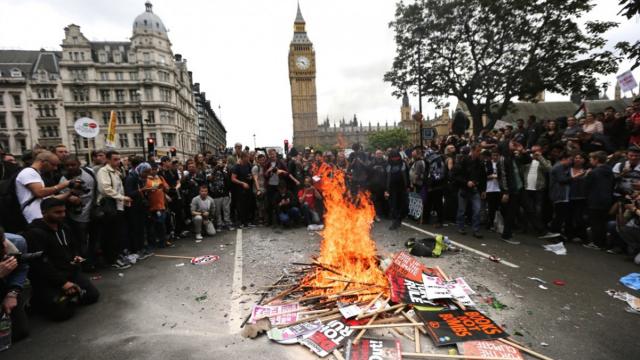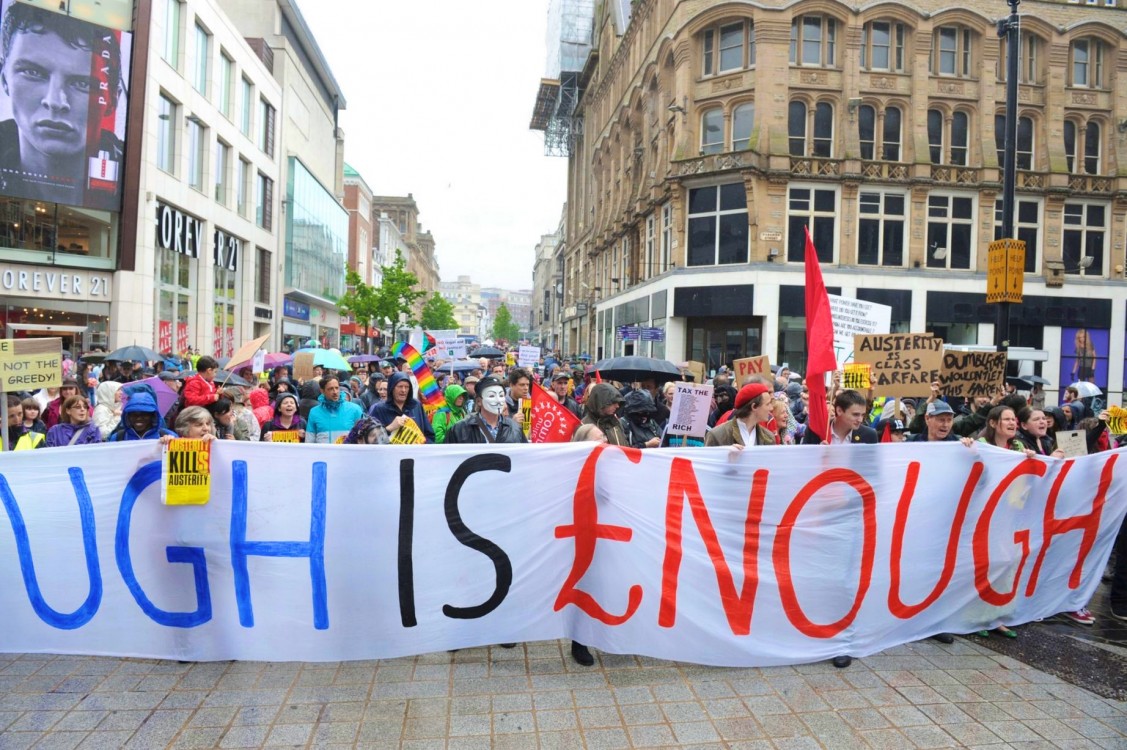
On Saturday, hundreds of thousands took part in anti-austerity demonstrations in cities throughout the U.K. The biggest of the marches was held in central London, where it was estimated that approximately 250,000 protesters gathered outside the Bank of England and then proceeded to march to the Houses of Parliament.
The protest was organized by the People’s Assembly Against Austerity, aimed at tackling the renewed austerity attacks by bringing together campaigns against cuts and privatization.
Among the protestors were politicians and celebrities, including Jeremy Corbyn, who is in the Labour leadership race; Green MP Caroline Lucas; comedian activist Russell Brand and singer Charlotte Church. The protest gathered in Parliament Square where several high-profile figures spoke about their resentment of the newly-elected Tory government and its tough new crackdown on poor and working people.
Martin McGuinness of the Irish political movement Sinn Fein addressed protestors in London by criticizing the “Tory millionaires.”
“The people the Tories are targeting are my friends, my neighbors, my family," McGuinness said. "They are fine, hard-working, proud and decent – just like our people in working class unionist communities.”
With live music and the banging of drums, the protest enjoyed the kind of “festival atmosphere” that organizers had promised. Families with young children joined in the march. Older protestors were also present, proving just how widespread and diverse austerity resentment is felt in Britain.
Coaches brought people from each corner of Britain to London, each with their own message to convey. Hundreds of banners and placards protruded from the crowds, reading everything from “A live wage for mothers” to “Save Our NHS” to “We’re as mad as hell and we’re not taking it anymore.”
Protests from Glasgow to Liverpool
It wasn’t just London that witnessed a swarm of solidarity in the fight against austerity. In Glasgow, thousands of protestors joined the Scotland United Against Austerity demonstration that ran simultaneous to the London protest.
The rally was organized by the Scottish Trades Union Congress (STUC). Grahame Smith, general secretary of the STUC, said the Tories' austerity measures were “not sensible economic policy.”
“We know austerity does not work. It is entirely about ideology and it is about protecting the position of the already privileged in society,” Smith told the BBC. As in London, high-profile speakers spoke at the event in Glasgow, including Pat Rafferty, Scottish secretary of Unite.
Nicola Sturgeon, first minister of Scotland, also backed the thousands of anti-austerity protestors in Glasgow, announcing in a statement: “I want to offer my support to those marching with the STUC today against the harsh, deeply unfair Tory cuts that are causing real pain for many in Scotland and across the U.K.”
“Five years of Tory austerity has done too much damage,” Sturgeon added.
On the same day, campaigners took to the streets of Liverpool in the north west of England to show their unity for the national protest. Protestors marched through the city chanting for “Fat cats to pay taxes,” to “save the NHS” and for the “Tory government to be ousted.”
Members of the Trade Union Congress, the Green Party and several other union and socialist organizations joined in the Liverpool march.
The June 20 anti-austerity demonstration is the latest event held in Liverpool this year to confront austerity cuts. In May, approximately 300 demonstrators united in Liverpool’s city center in a “no austerity demo.”
As coaches continued to pile into London with campaigners determined to join in the country's biggest march, many smaller cities and towns in Britain saw citizens flock to the streets to lend their own voices to the anti-austerity movement. The sheer magnitude of the event certainly highlighted the discontent the British people are feeling towards the inequality and poverty that have risen in the U.K. during the last five years.
“It will be the start of a campaign of protest, strikes, direct action and civil disobedience up and down the country,” Sam Fairbairn of the People’s Assembly told The Independent.
Testament that inequality is widening in the U.K. were recent figures, released by the New Policy Institute, which show that due to a rising below-inflation benefit and bedroom tax, an estimated 760,000 people have been pushed into poverty since the last official figures were produced.
The NPI report also revealed that child poverty has experienced the biggest rise, with 300,000 children being forced to live on the breadline.
Ironically, as the Tories drone on about how their austerity policy has purportedly “saved the country from disaster,” it has been suggested that Chancellor George Osborne’s “neoliberal right economics” have ultimately hampered economic growth.
Adding weight to this argument is a recently published report by the International Monetary Fund that found that the increasing wealth gap between rich and poor is detrimental to economic growth.
The study focused on various countries around the world and found that where the richest took a disproportionately high share of income, economies grew at a slower rate.
The economists involved in the report said that if governments want to raise the pace of growth they should focus on helping the poorest 20% in society. Instead, in Britain, the richest 1,000 families own more than the poorest 40% of households, controlling a total of £547 billion.
3 WAYS TO SHOW YOUR SUPPORT
- Log in to post comments
















